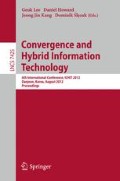Abstract
Since code-division multiple-access (CDMA) systems are interference limited, interference managements in terms of power control and interference cancelation have been investigated extensively in the past. In this paper, we consider a power control scheme for CDMA communications with successive interference cancelation (SIC). The proposed scheme is to make the received power levels be geometrically distributed such that the average BER after cancelation, averaged over all users, can be minimized. We show that the performance of the proposed scheme is significantly improved over existing power control schemes.
Access this chapter
Tax calculation will be finalised at checkout
Purchases are for personal use only
Preview
Unable to display preview. Download preview PDF.
References
Viterbi, A.J., Viterbi, A.M., Zehavi, E.: Performance of power-controlled wideband terrestrial digital communication. IEEE Trans. Commun. 41, 559–569 (1993)
Cameron, R., Woerner, B.: Performance analysis of CDMA with imperfect power control. IEEE Trans. Commun. 44, 777–781 (1996)
Moshavi, S.: Multi-user detection for DS-CDMA communications. IEEE Commun. Mag. 34, 124–136 (1996)
Verdu, S.: Multiuser Detection. Cambridge University Press (1998)
Patel, P.R., Holtzman, J.M.: Analysis of a simple successive interference cancellation scheme in a DS/CDMA system. IEEE J. Select. Areas Commun. 12, 796–807 (1994)
Viterbi, A.J.: Very low rate convolutional codes for maximum theoretical performance of spread-spectrum multiple-access channels. IEEE J. Select. Areas Commun. 8, 641–649 (1990)
Mazzini, G.: Equal BER with successive interference cancellation DS-CDMA systems on AWGN and Ricean channels. In: Proc. IEEE PIMRC, pp. 727–731 (September 1995)
Buehrer, R.M.: Equal BER performance in linear successive interference cancellation for CDMA systems. IEEE Trans. Commun. 49, 1250–1258 (2001)
David, H.A.: Order Statistics, 2nd edn. John Wiley and Sons (1981)
Proakis, J.G.: Digital Communications, 3rd edn. McGraw-Hill (1995)
Author information
Authors and Affiliations
Editor information
Editors and Affiliations
Rights and permissions
Copyright information
© 2012 Springer-Verlag Berlin Heidelberg
About this paper
Cite this paper
Lee, Y.H. (2012). A Transmit Power Control Method for DS/CDMA Communication Systems Using Successive Interference Cancelation. In: Lee, G., Howard, D., Kang, J.J., Ślęzak, D. (eds) Convergence and Hybrid Information Technology. ICHIT 2012. Lecture Notes in Computer Science, vol 7425. Springer, Berlin, Heidelberg. https://doi.org/10.1007/978-3-642-32645-5_13
Download citation
DOI: https://doi.org/10.1007/978-3-642-32645-5_13
Publisher Name: Springer, Berlin, Heidelberg
Print ISBN: 978-3-642-32644-8
Online ISBN: 978-3-642-32645-5
eBook Packages: Computer ScienceComputer Science (R0)

